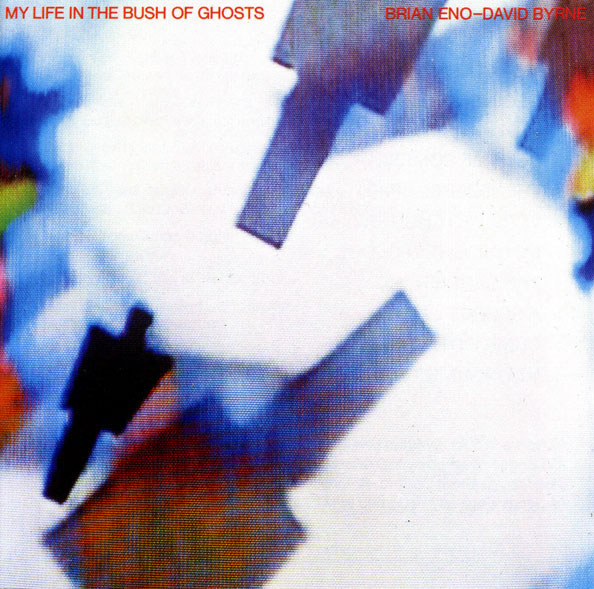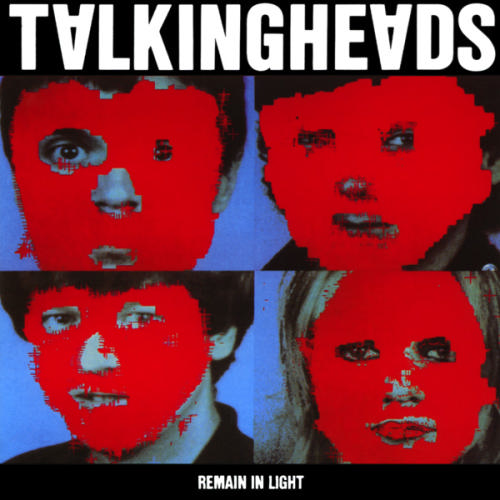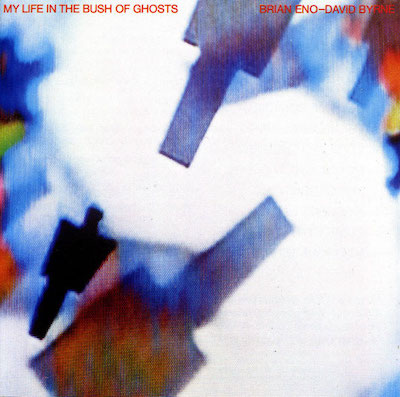Brian Eno and David Byrne : My Life in the Bush of Ghosts

After Kraftwerk laid the template for electronic pop with 1974’s Autobahn, Brian Eno took it a step further with his stunning Another Green World. From that point on, his work would evolve into new forms and shapes, while his production work with bands like Devo and the Talking Heads promised new, experimental sounds in new wave. Arguably the greatest album with an Eno production credit is Remain in Light, the Talking Heads’ mind-blowing fourth album, and unprecedented blend of genres. Recorded before, during and after Light, Eno and Heads leader David Byrne’s next project arrived next—the aesthetically stunning and unpredictably experimental My Life in the Bush of Ghosts.
Ghosts wasn’t the first of its kind, the aforementioned Kraftwerk getting a headstart and bands like Cabaret Voltaire combining found sound, sampled voices and sequenced synth programs. But Ghosts was, and still remains, one of the most finely crafted and fully-realized albums in electronic music. Rather than rely on endless loops and intentionally synthetic-sounding instrumentation, Ghosts is remarkably organic. In many respects, it’s an extension of the ideas explored on Remain in Light, in that it delves into that album’s more obscure sounds, pushing aside lyrics and separation of verse and chorus in favor of an exploratory form that’s as playful as it is unconventional.
The album opens with “America Is Waiting,” a woozy swirl of scratchy guitar stabs, funky drums, samples of a right wing talk show host and Bill Laswell’s slap bass. It seems a bit disorienting at first, yet gels into a propulsive tour-de-force. As energizing as Remain in Light‘s opener “Born Under Punches,” but not straightforward, it’s a proper introduction to the duo’s oddball sound. “Mea Culpa,” meanwhile, builds upon echoing voice samples and a steady synth bassline, treading into territory both more synthetic and more exotic. And “Regiment” mixes Busta Jones’ funked-out bass jam with a haunting sample of a Lebanese vocalist, combining elements that are complementary in unlikely ways.
That each song has a new “vocalist” by way of varying sampled voices keeps each song individual, and with separate statements being put forth with the lapse of each track. “Help Me Somebody” is one of the album’s greatest moments, a preacher’s sermon provided as a sort of R&B vocal over the funky, Afrobeat rhythms. Similarly, “The Jezebel Spirit” puts an exorcism at the front of a loose groove.
Comparatively, the second half of the record features more subdued vocal samples, as well as mellower grooves, beginning with the almost reggae-like “Very, Very Hungry.” The same vocalist from “Regiment” is paired with ambient waves on “The Carrier.” “A Secret Life,” a mostly percussive affair, finds its voice in an Egyptian pop singer. “Come With Us” almost seems like a computer glitch, various bleeps interrupting serene rhythms, and it begins to appear as if the record has been gradually degenerating after the first five songs. This side more explicitly ties to Brian Eno’s ambient works, preferring subtle electronics and softer textures to Byrne’s amped-up funk. And the final track, the placid “Mountain of Needles” solidifies that, sounding the most like a genuine Eno solo work.
Undeniably influential and, at the time of its release, unique, My Life in the Bush of Ghosts was an incredibly novel album at the time of its release, and remains a solid listen. What separates it from most modern electronica is its warmth. As it was recorded in the late ’70s and early ’80s, it’s pretty much all analog on there, and for that, the album almost sounds like a distant cousin to Remain in Light. Yet, as it wasn’t so much a pop album, it’s sometimes viewed as something that exists in both avant garde and popular music realms simultaneously. Decades later, it remains a peak of innovation in electronic music.
Label: Sire
Year: 1981
Similar Albums:
Note: When you buy something through our affiliate links, Treble receives a commission. All albums we cover are chosen by our editors and contributors.
Jeff Terich is the founder and editor of Treble. He's been writing about music for 20 years and has been published at American Songwriter, Bandcamp Daily, Reverb, Spin, Stereogum, uDiscoverMusic, VinylMePlease and some others that he's forgetting right now. He's still not tired of it.





